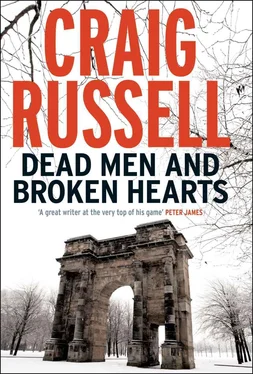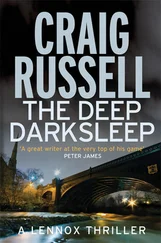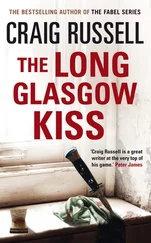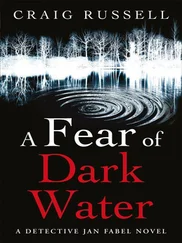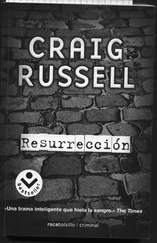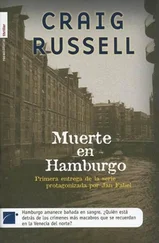Craig Russell - Dead men and broken hearts
Здесь есть возможность читать онлайн «Craig Russell - Dead men and broken hearts» весь текст электронной книги совершенно бесплатно (целиком полную версию без сокращений). В некоторых случаях можно слушать аудио, скачать через торрент в формате fb2 и присутствует краткое содержание. Жанр: Триллер, на английском языке. Описание произведения, (предисловие) а так же отзывы посетителей доступны на портале библиотеки ЛибКат.
- Название:Dead men and broken hearts
- Автор:
- Жанр:
- Год:неизвестен
- ISBN:нет данных
- Рейтинг книги:4 / 5. Голосов: 1
-
Избранное:Добавить в избранное
- Отзывы:
-
Ваша оценка:
- 80
- 1
- 2
- 3
- 4
- 5
Dead men and broken hearts: краткое содержание, описание и аннотация
Предлагаем к чтению аннотацию, описание, краткое содержание или предисловие (зависит от того, что написал сам автор книги «Dead men and broken hearts»). Если вы не нашли необходимую информацию о книге — напишите в комментариях, мы постараемся отыскать её.
Dead men and broken hearts — читать онлайн бесплатно полную книгу (весь текст) целиком
Ниже представлен текст книги, разбитый по страницам. Система сохранения места последней прочитанной страницы, позволяет с удобством читать онлайн бесплатно книгу «Dead men and broken hearts», без необходимости каждый раз заново искать на чём Вы остановились. Поставьте закладку, и сможете в любой момент перейти на страницу, на которой закончили чтение.
Интервал:
Закладка:
‘That was a great night out, thanks, Lennox. If you don’t mind I’m just going to turn in. Like I said, I didn’t get much sleep last night.’
‘Fiona, I don’t know what’s going — ’
I was cut off by the ringing of the wall ‘phone in the hall. Fiona squeezed past me to answer it.
‘Yes, he’s here…’ she said and held the receiver out to me to take. It looked large and heavy in her small, slender hand.
‘Hello, Mr Lennox?’ I recognized the voice instantly.
‘Hello, Mrs Ellis, what can I do for you?’
‘You told me to telephone you if Andrew went out unexpectedly. Well he has, he’s just getting into his car now.’
‘At this time?’ I looked at my watch. It was five after ten.
‘He got a ’phone call just a minute ago,’ she explained. ‘Same as always, very short.’
‘Did you hear the word “Tanglewood” mentioned this time?’
‘I couldn’t hear much of anything, I was in the lounge and the radio was on, but I don’t think so. He just seemed to keep saying “yes” then he hung up. It’s almost like someone’s telling him what to do. As if Andrew is being given orders or instructions or something. I have to tell you, Mr Lennox, there’s something about this frightens me.’
‘He hasn’t given you any idea where he’s going?’
‘Just the usual “I have to go out, something’s come up with a customer”.’
‘And how was he? His demeanour, I mean?’
‘He didn’t seem anything in particular. He tried to make out he was annoyed at being disturbed… but whatever was going through his head, that wasn’t it.’
I thanked her and said that I had better go and see if I could pick up his trail.
‘I’ve got to go out. Sorry,’ I said to Fiona, who shrugged, went into her flat and closed the door. Normally I would have expected to sense her annoyance, but all I picked up this time was relief.
I drove too fast to Maryhill Road, trying to close a distance greater than Ellis had to travel. I took the turning Ellis had taken before, just around the corner from where my Teddy Boy Scouts had helped me get the Atlantic started again, and swung the car around to face back out towards the junction where I could see passing traffic on Maryhill Road.
I switched the engine off and waited five minutes before deciding to give up, working out that Ellis must have already passed by, or had taken another route. The Atlantic conked out on me again and it took me a couple of expletive-urged turns to get her started. It was not a good night for hunting, anyway: the darkness was starting to tinge greenish as smog began to turn the air grainy. I would be lucky to see anything ten feet in front of me — which was exactly the distance I was from the glossy claret flank of Ellis’s Daimler as it sleeked past the road junction.
Startled, I clunked the lever into first, offering a silent prayer that the Atlantic didn’t stall again, and swung out onto Maryhill Road behind him, sticking close to his tail. The fog-turning-to-smog was getting thicker and I worked out that it was maybe drifting in from the North, which meant it had slowed Ellis’s drive into town while mine had been unimpeded. I decided to leave the dentistry of this particular gift horse unexamined and focused on keeping Ellis in sight.
There was a tried and tested habit in the Glasgow smog of playing follow-my-leader, leaving the driver in front to work for you by keeping the kerb in sight, so I knew that Ellis would not suspect the lights in his rear-view were anything other than an innocent fellow traveller navigating the miasma. Fortunately, one of the many things to have failed recently on the Atlantic was the central headlamp; if Ellis had seen me the first evening I had tailed him, then tonight the Atlantic would not be showing its distinctive three lamps in his mirror.
Progress became painfully slow as Glasgow’s night air took on the consistency of broth. Travelling little faster than walking pace, Ellis led me — and three cars behind me — through the city and out to the West End. A couple of turnings and I lost both the entourage of cars and my bearings. Mine being the only other car following Ellis’s made me more conspicuous, and I eased back until the Daimler’s tail lights reduced to faint red smudges in the gloom. It was practically impossible to get any kind of idea of where we were in the smog, but I reckoned we were somewhere in the Garnethill district of the city. Driving through smog demands total focus and I wasn’t able to look out for some kind of landmark or street sign to become visible, but I knew I would need something if I wanted to find my way back in the daylight.
We turned into a narrow street that seemed to arc around then uphill. I wondered if Ellis was doing the same kind of elaborate stunt he had pulled in Maryhill and was taking odd turns just to check if I was following him. After about twenty yards, the Daimler stopped. We were now in a narrow street with only the odd parked car. I drove past and allowed myself to be swallowed up by the smog before pulling up after fifty yards or so at what I hoped was the kerb.
I switched the engine off and got out of the car as quickly as I could, straining to hear any sounds from the Daimler. I locked the Atlantic and found the pavement without tripping over it, then fumbled my way back to where Ellis had stopped. Smog in Glasgow is the most difficult thing to describe to someone who has never experienced it. The oily smoke that the city’s industry and tenement chimneys pumped into the sky seemed to be drawn back into the ground-hugging fog that soaked it up like a sponge. The result was something dense and choking that took the lives of anyone too weak, too ill, too old or too young to resist its smothering blanket. Whatever the chemistry involved, the mix of soot, smoke and fog became something green-tinged and cloying. The simple act of walking became an experience of sensory deprivation where you existed in a tiny, arm’s-length confined universe. My unease in the smog was particularly acute: I had been jumped twice before by attackers using the dense fug as cover. These were, without doubt, the worst possible conditions for surveillance and I cursed Glasgow’s climate with more vehemence than usual.
The Daimler was parked and empty and I considered myself lucky to have found it. I peered through the miasma to try to estimate where exactly I was and which direction Ellis was likely to have taken. I found myself against a high, windowless wall and, running my hand along the brickwork as a guide, I tried to find a doorway.
I almost walked straight into Ellis.
He was standing at the foot of some steps that led up to an arched doorway. I realized that the masonry I had been following wasn’t the wall of a building, but a soil-retaining bulwark that divided the roadway from a terrace of buildings elevated above it. As I had followed the wall around the sweep of the street, I had been climbing to the same level as the buildings.
And now I was face-to-face with the man I was supposed to be shadowing. Stealth was my middle name.
Ellis turned and looked startled for a moment when he first saw me and I was pretty sure that I must have had the same expression on my face. But I was confronted with more than Ellis: I was faced with the fact that his wife had been right all along. Next to Ellis was a young woman with unfashionably shoulder-length black hair. Like the hair, her clothes were out of fashion and looked old without being shabby. Her coat was too heavy for November in the west of Scotland, where the emphasis had to be on waterproofing rather than insulation, and the cut was something I hadn’t seen in Glasgow before. Perched on her head was a small toque-type hat that did not match the coat. None of which mattered, because she had the kind of smouldering dark beauty that made you want to look through the clothes rather than at them. Set above a classical architecture of cheekbone and jaw, her eyes were large and a dark, nutty brown; her full lips had been lipsticked crimson but otherwise her face seemed naked of make-up that she would not have needed.
Читать дальшеИнтервал:
Закладка:
Похожие книги на «Dead men and broken hearts»
Представляем Вашему вниманию похожие книги на «Dead men and broken hearts» списком для выбора. Мы отобрали схожую по названию и смыслу литературу в надежде предоставить читателям больше вариантов отыскать новые, интересные, ещё непрочитанные произведения.
Обсуждение, отзывы о книге «Dead men and broken hearts» и просто собственные мнения читателей. Оставьте ваши комментарии, напишите, что Вы думаете о произведении, его смысле или главных героях. Укажите что конкретно понравилось, а что нет, и почему Вы так считаете.
